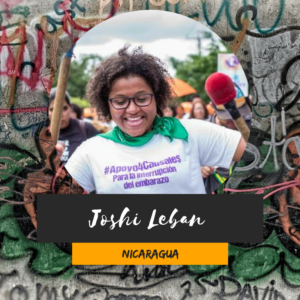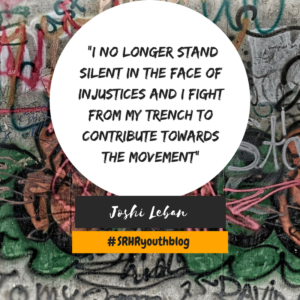#SRHRYouthBlog Commemorating International Women’s Day!

*English version follows
Cuando se me pidió que escribiera un blog sobre lo que significa el activismo para mi o por qué elegí ser activista, accedí de inmediato. Por varios días tuve cierto bloqueo, las palabras no fluían y casualmente hoy en la mañana del 8 de Marzo la fuerza feminista hizo que la inspiración llegase.
Muchos esperan fechas por lo que significan. Por ejemplo, algunos esperan con ansias el mundial en mi casa. Cada fecha conmemorativa es la oportunidad de posicionar las demandas que las mujeres tenemos ya que no siempre son escuchadas, y este 8 de marzo no es la excepción.
Soy Joshi Leban, una Nicaragüense radicada en El Salvador. Se preguntarán por qué vivo en El Salvador y no en Nicaragua, la respuesta es simple: mi familia y yo queríamos empezar de nuevo. Durante más de 2 años fui víctima de abuso sexual por un familiar. Solamente tenia 13 años cuando empezó ese calvario. Callar no fue fácil recuerdo muy bien que tenía muchas pesadillas y por supuesto miedo ya que constantemente era amenazada para seguir guardando silencio. Un día, a mis cortos 13 años tomé el valor para decirle a mi madre lo que sucedía y con esto mi calvario llegó a su fin. No se si fue el destino pero las cosas fueron tomando su lugar y con mi mamá migramos para El Salvador a iniciar de nuevo, dejando todo.
Cuando llegue a El Salvador no lograba adaptarme, la comida, la gente era diferente. Y nuevamente la vida me dio una oportunidad: un grupo de jóvenes llegaron a la escuela a contar que ellos hacían danza y teatro pero le agregaban un componente, la salud sexual y reproductiva. Decidí ser parte de este grupo y desde ese momento mi vida cambió. Como parte de los esfuerzos de este grupo juvenil se realizó una campaña sobre el abuso sexual llamada “Poné los 6 sentidos” y claro, fue muy difícil para mi porque me trasladaba a esa situación que deje en Nicaragua. Sin embargo, al darme cuenta que habían muchas más chicas que como yo habían pasado por lo mismo, decidí hablar y contar mi historia porque no quería que nadie más pasara por lo que yo pasé.
Empecé a formarme en temas como prevención de violencia, cultura de paz, métodos anticonceptivos y prevención de embarazo en adolescentes. Fui parte de esfuerzos importantes como la Ley General de Juventud, la creación de un ente rector y la Política de Empleo Juvenil y a partir de esto tuve mi primer empleo y logré regularizar mi situación migratoria. Luego fui invitada a una red de jóvenes que trabajaba derechos sexuales y reproductivos. Allá por 2013 recuerdo que en una de las asambleas una colectiva de mujeres feministas—era la primera vez que escuchaba la palabra feminismo—mencionó el caso de Beatriz, una mujer que pedía al Estado se le interrumpiera su embarazo. Yo por supuesto estaba en desacuerdo porque no comprendía del todo como alguien podría hacer eso. Luego esta misma colectiva me invitó a una reunión en la “Casa de todas” con la Colectiva Feminista, la Agrupación Ciudadana por la Despenalización del Aborto y fue ahí cuando toda esa construcción social que me orillaba estar en contra del aborto se desmoronó. No podía entender por qué torturaban a Beatriz de esa manera. Porque si el feto era anencéfalo y no tenia posibilidades de vida seguían prolongando su embarazo. ¿Por qué todos podían opinar sobre lo que era mejor para Beatriz menos ella? No lo comprendía. Recuerdo participar en una conferencia de prensa donde presentaron un video (no mostraban su rostro) en el que ella pedía al Estado que la dejara vivir (el embarazo complicaba su situación ya que ella tenia lupus). Lloré, no entendía, seguía sin entender por qué le estaban haciendo eso.
Fueron días sin descanso, muchas veces no tenía dinero para viajar desde Lourdes (lugar donde residía antes) hasta San Salvador, así que ésta amiga que me invitó a esa primera reunión me apoyaba para que yo pudiera transportarme, e hizo un regalo muy trascendental: me regaló un libro llamado “Feminismo para principiantes” y desde ese día me nombro feminista, defensora y activista. Con el paso de los años seguí de cerca el trabajo de la Agrupación y conocí la Campaña de las 17 y desde hace 2 años colaboro de tiempo completo para el cambio de ley que permita la interrupción del embarazo.
Este 8 de marzo les comparto un poco de mi historia, que es la historia de muchas, de todas. De cómo el feminismo, el activismo nos cambió la vida. Que desde que decidí usar las “gafas moradas” mi vida no es la misma, me molestan las injusticias y lucho desde mi trinchera para aportar un poco por esas transformaciones— este 8 de marzo sumo mi voz, doy un grito por Beatriz, por las 17 por todas las mujeres que han muerto por la violencia feminicida, por todas las mujeres que han muerto o están en prisión por una ley retrograda y absurda. Ni una menos, vivas y libres nos queremos.
Puedes seguir a Joshi en Twitter @joyleban
When I was asked to write a blog about what activism means to me or why I chose to be an activist, I immediately said yes. For several days though, I suffered from writer’s block. Words simply did not flow. Coincidentally, today on the morning of March 8 the feminist strength made the words flow right out of me.
Many await special dates for what they mean. For example, some are looking forward to the World Cup at my house. Each commemorative date is an opportunity to position the demands that we have as a movement, this March 8 is not the exception.
I am Joshi Leban, a Nicaraguan young woman living in El Salvador. You might be wondering why I live in El Salvador and not in Nicaragua. The answer is simple, my family and I wanted to start over. For more than 2 years I was a victim of sexual abuse at the hands of a family member. I was only 13 years old when the ordeal began. It was not easy, I had nightmares and of course fear, since I was constantly threatened to stay silent. One day, I summoned the courage to tell my mother what was happening and with this action, my ordeal came to an end. I do not know if it was destiny but things eventually took their course and together with my mom, we migrated to El Salvador to start again, leaving everything behind.
When I arrived in El Salvador it was hard for me to adapt, the food, the people, everything was different. And again, life presented me with an opportunity: a group of young people came to my school to talk about their involvement with dance and theater, and they shared that their group was special because they discussed sexual health and reproductive rights in all of their productions. I decided to join this youth group and from that moment onwards, my life changed. As part of the efforts of this youth group, we carried out a campaign on sexual abuse called “Use the 6 senses” and of course it was very difficult for me because it reminded me of what I went through, and the reason why I left Nicaragua. However, when I realized that there were many more girls who had gone through the same thing, just like me, I decided to speak up and share my story. I did not want anyone else to go through what I had gone through.
I started to educate myself in topics such as violence prevention, culture of peace, contraceptive methods and prevention of teen pregnancy. I was part of important efforts such as the General Youth Law, the creation of a governing body and the Youth Employment Policy, from which I had my first job and managed to regularize my immigration status. After this, I was invited to join a network of young people who worked on sexual and reproductive rights. Back in 2013 I remember that in one of the events, a Collective of feminist women (it was the first time I had heard the word feminism) mentioned the case of Beatriz, a woman who was pleading the state to let her interrupt her pregnancy. I disagreed at this point, because I did not understand at all why someone would want to do that. Then, this same group invited me to a meeting in the “Casa de todas” with the Colectivo Feminista, and Agrupación Ciudadana por la Despenalización del Aborto. That’s when all the social constructs that pushed me to stand against abortion completely fell apart in my mind. I could not understand why Beatriz was tortured in that way, if the fetus was not viable outside the uterus, why did they continue prolonging that pregnancy? Why did everyone have a say on what was best for Beatriz except her? I did not understand. I remember participating in a press conference where they presented a video (they did not show her face) where she asked the state to let her live (the pregnancy complicated her condition since she had lupus) I cried, I did not understand, I still do not understand why they were doing that.
There were days without rest. Many times I did not have money to travel from Lourdes (where I lived before) to San Salvador, so this friend who invited me to that first meeting supported me so I could travel. She also gave me a book called “Feminism for beginners.” Since that day I call myself a feminist, a defender and an activist. After this, I continued following closely the work of the Agrupación Ciudadana, and learned about “Las 17 Campaign.” It has been 2 years now since I collaborate full time with them working towards the change of law that allows the interruption of pregnancy.

This March 8 I share a bit about my story, which is the story of many—the story of all—about how feminism and activism changed my life. Ever since I decided to use the “purple glasses” my life has not been the same. I no longer stand silent in the face of injustices and I fight from my trench to contribute towards the movement—this March 8 I add my voice, I cry out for Beatriz, for the 17, for all the women who have died from feminicidal violence, for all women who have died or are in prison because of a retrograde and absurd law. Ni una menos, vivas y libres nos queremos.
Follow Joshi via Twitter @joyleban
